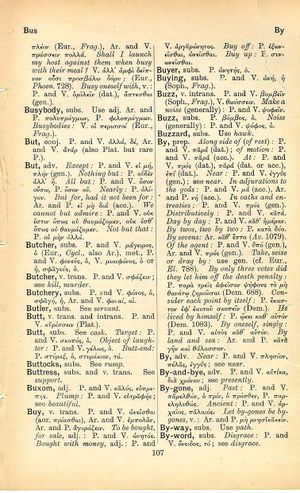butcher: Difference between revisions
From LSJ
Cras amet qui numquam amavit quique amavit cras amet → May he love tomorrow who has never loved before; And may he who has loved, love tomorrow as well.
(CSV3) |
m (Woodhouse1 replacement) |
||
| Line 1: | Line 1: | ||
{{Woodhouse1 | {{Woodhouse1 | ||
|Text=[[File:woodhouse_107.jpg|thumb|link={{filepath:woodhouse_107.jpg}}]] | |Text=[[File:woodhouse_107.jpg|thumb|link={{filepath:woodhouse_107.jpg}}]] | ||
===substantive=== | |||
P. and V. [[μάγειρος]], ὁ (Eur., '' | [[prose|P.]] and [[verse|V.]] [[μάγειρος]], ὁ ([[Euripides|Eur.]], ''[[Cyclops]]'', also [[Aristophanes|Ar.]]), Met., [[prose|P.]] and [[verse|V.]] [[φονεύς]], ὁ, [[verse|V.]] [[μιαιφόνος]], ὁ or ἡ, [[σφαγεύς]], ὁ. | ||
===verb transitive=== | |||
P. and V. σφάζειν; see [[kill]], [[murder]]. | [[prose|P.]] and [[verse|V.]] [[σφάζειν]]; see [[kill]], [[murder]]. | ||
}} | }} | ||

